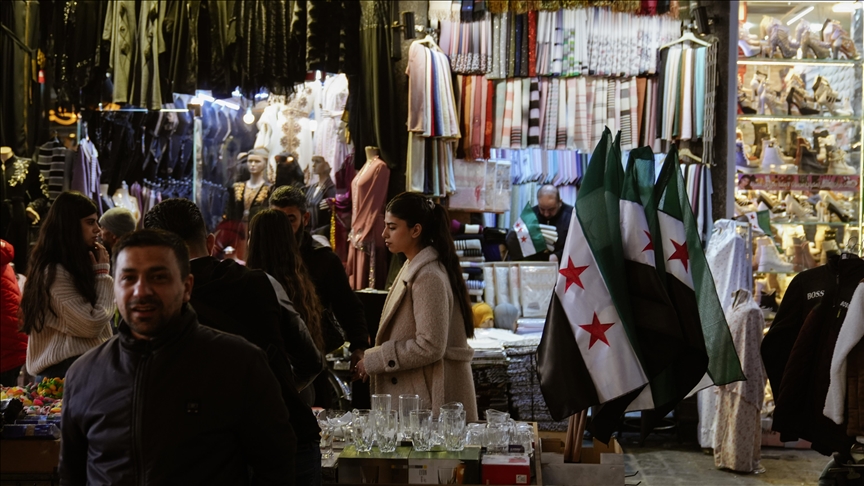As investments raise hope, how can Syria navigate economic revival?
Syria has signed deals worth billions in energy, ports and manufacturing, raising hopes of recovery but also questions over the challenges ahead
 People do shopping at Al-Hamidiyeh Souq in the capital Damascus, Syria
People do shopping at Al-Hamidiyeh Souq in the capital Damascus, Syria
- Syria has signed deals worth billions in energy, ports and manufacturing, raising hopes of recovery but also questions over the challenges ahead
- Expert lauds Syrian government’s steps towards becoming a liberal economy, but says some sectors still need to be protected
- Government should prioritize productive and strategic sectors like energy, transport and manufacturing, says senior research analyst Benjamin Feve
ISTANBUL
After more than a decade of war and international isolation, Syria’s economy is entering a new and uncertain phase.
Entire sectors were left in ruins by years of conflict, and the country’s infrastructure, currency and workforce remain severely depleted. Now, with Bashar al-Assad gone and sanctions easing, regional allies and foreign investors are showing renewed interest.
Dozens of investment memoranda worth billions have been signed in energy, ports and manufacturing – raising hopes of recovery but also questions over whether these projects could deliver broad-based growth or deepen existing inequalities.
The scale of devastation makes the stakes enormous. The Baath regime’s 61-year grip on power left behind weak infrastructure, stalled development and entrenched corruption. In 2011, the civil war plunged the economy into freefall – GDP collapsed by more than 40% and the Syrian pound lost over 99% of its value against the US dollar during 14 years of conflict.
After the Assad regime was toppled in December 2024, Western states began lifting sanctions and encouraging foreign investment to help rebuild the nation.
In July, Damascus hosted the first Syria-Saudi Investment Forum, during which 44 deals worth $6 billion were announced. The same month, Syria sealed an $800-million deal with Dubai Ports World (DP World), one of the world’s largest port operators, to strengthen port infrastructure and logistics services.
In early August, Syria signed $14 billion in investment memoranda with companies from Qatar, the United Arab Emirates, Italy, and Türkiye.
In late August, Saudi Arabia signed an agreement and six memorandums of understanding with Syria covering energy cooperation.
Another $7 billion energy investment deal signed by Turkish, Qatari and US companies in May promises to significantly boost Syria’s electricity supply and improve living conditions for millions.
Foreign investment remains key
Benjamin Feve, a senior research analyst at Karam Shaar Advisory Limited, told Anadolu that the new government led by President Ahmad al-Sharaa has pledged to steer Syria toward a freer, more liberal economic model.
“They’ve lifted most tariffs on products, on imports, so the countries import and export as they wish. They have also lifted subsidies on many products, on goods, on oil, on gas,” he said.
The investment law has been amended to make it easier for foreign companies to bring in capital and repatriate profits.
“What the government is trying to do is attract foreign investment, because without it, the Syrian economy won’t be able to recover,” Feve said.
Despite some $50 billion in pledged investments, Feve noted that the vast majority has yet to materialize.
“They’re not contracts, not agreements, not actual investments or capital that has entered Syria just yet,” he noted.
Even in Europe, only around 60% of the investment pledges materialize into actual investments, he said, suggesting this figure may even rise to 90% for Syria due to the uncertain environment.
“But even if only 10% of the investments materialize, that equals $5 billion, which is really huge for the Syrian economy,” Feve added.
Still, recovery will be long and slow, he stressed.
“We will have to wait decades before the economy really recovers. Maybe even in 10 years, the economy will not be as strong as it was before the beginning of the uprising and the war,” he added.
Challenges to recovery
Feve stressed that security remains a fundamental issue for the Syrian economy, with risks ranging from continued internal strife to Israeli bombings.
“I think what the government needs to do to ensure speedy recovery is to secure the country,” he said.
He also pointed to current shortcomings in the business environment.
“The government also needs to continue opening the economy and being transparent, especially with regards to investments, investment laws and with how it’s proposing projects for investors,” he said.
“If you want to open a company in Syria, or if you want to invest in a project, it’s very difficult to know who to talk to, how to proceed.”
While Damascus has taken steps toward liberalizing the economy, Feve argued it is still too early for a full free-market transition.
“Some of the industry and some sectors should be protected, especially now,” he said.
He described existing subsidies as “quite wasteful” but said lifting them outright would require safeguards – compensating price increases with financial support and the social safety net.
Priority sectors
Feve urged Syria to work with international institutions such as the World Bank and UN to repair basic infrastructure.
“If you cannot power your factory, you’re not going to invest, or you’re not going to build a factory at all,” he said.
While tourism, banking and real estate may attract quick capital, he argued they should not be the focus. Instead, he would like to see the government steering investment toward productive and strategic sectors like energy, transport, and manufacturing.
“Sure, you can invest in real estate, in tourism, but these sectors are not so productive. They’re good on paper and they bring in a lot of money, but having huge buildings in Damascus is not going to help the overall population prosper,” he said.
Anadolu Agency website contains only a portion of the news stories offered to subscribers in the AA News Broadcasting System (HAS), and in summarized form. Please contact us for subscription options.







